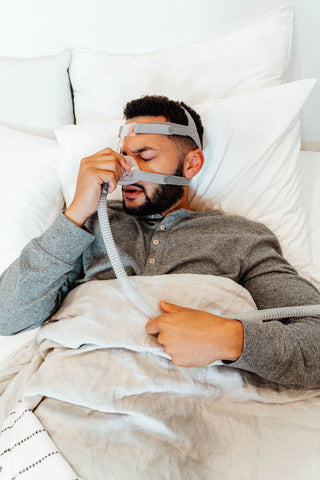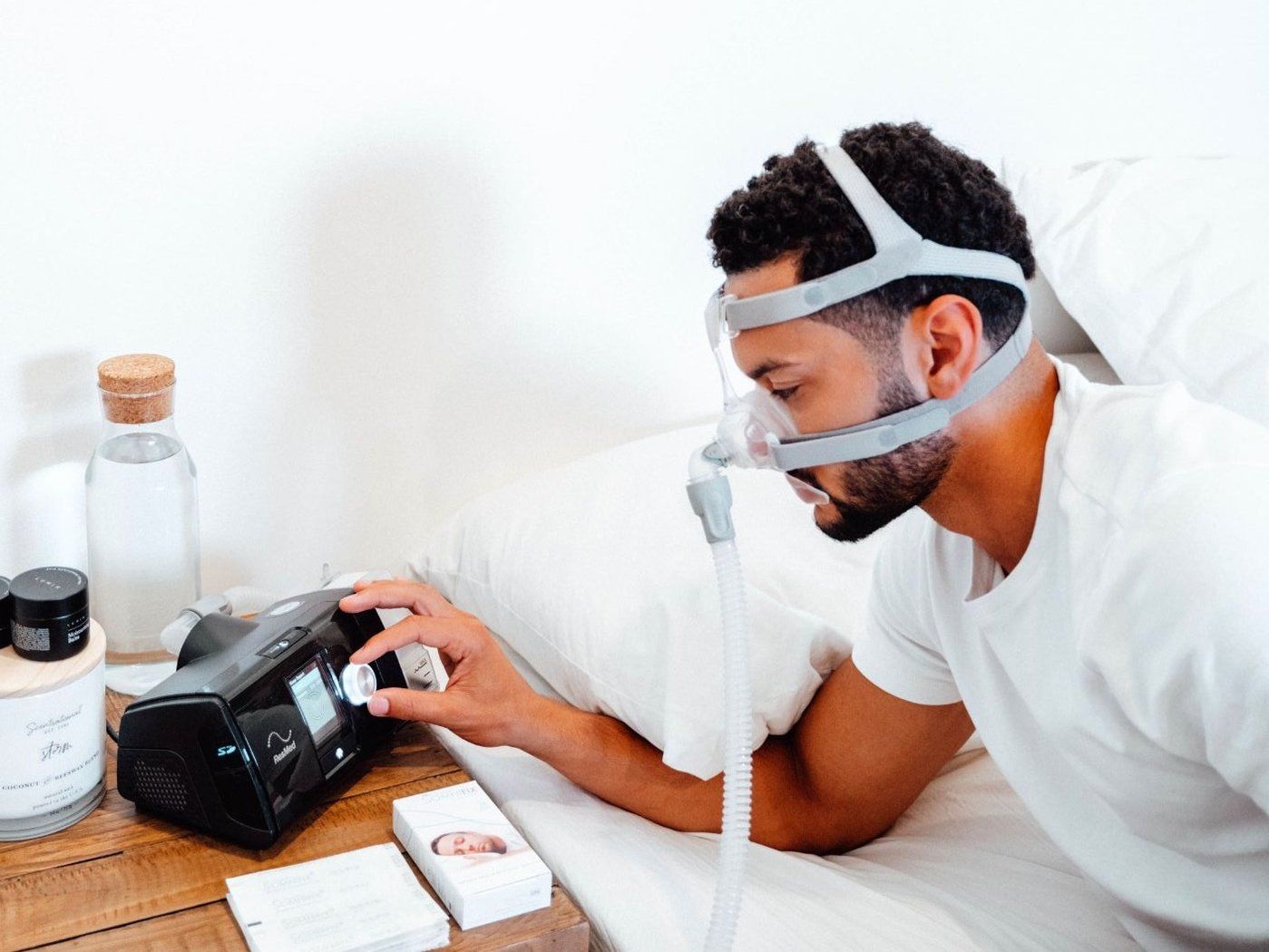If left untreated, sleep apnea can truly wreck your health.
In extreme cases, untreated sleep apnea may even lead to an increased risk of death.
That said, the discomfort of a very dry mouth in the morning after using a CPAP machine is enough to make many patients call it quits on treatment.
Around 40% of CPAP users report that they suffer from very dry mouth in the morning. Dry mouth is associated with even more pesky irritations, like bad breath, headaches, allergies, illness, inflammation, and other discomforts.
So, how do you use your CPAP at night and avoid waking up with a very dry mouth in the morning? Enter: your CPAP’s humidification feature.
Say Hello to Humidity
No one loves stepping outside in humid, muggy weather.
But the opposite is true when it comes to your CPAP machine. Before you break up with your CPAP machine for good, take a closer look at adding humidification to the mix.
Since a CPAP machine works by forcing air into the airway to prevent obstruction, added moisture is a must.

CPAP humidification adds moisture to the air prior to delivery to the airway, which reduces irritation of the nasal passages. This lowers your chances of mouth breathing, which is one of the top causes of dry mouth in the morning.
As you age, CPAP humidification becomes increasingly important. In fact, patients over 60 years of age are five times more likely to need CPAP humification.
With proper use of a CPAP humidifier, you’ll finally put an end to waking up with a very dry mouth in the morning.
However, there are multiple types of humidifiers to consider.
Different Types of CPAP Humidifiers
Choosing the type of humidifier that will work best for your needs may sound overwhelming.
The good news is that the medical supplier that supplied your machine should be able to help you pick the best humidifier for you.

Common types include:
- A built-in humidifier, where the pieces cannot be removed (aside from the water chamber)
- An integrated humidifier that connects to your specific machine
- A stand-alone humidifier that utilizes a hose to attach to most machines that don’t already offer humidification
Aside from the type of humidification, there are typically different temperature settings with each humidifier.
Passover humidifiers use room temperature water that isn’t heated or cooled. As the temperature in your room drops overnight, so will the temperature of the water.
Heated humidification, however, warms the water before it’s added to the air delivered to your airway. You can adjust the temperature based on your needs.

Most CPAP users prefer heated humidification, as it provides the most comfortable air delivery while also reducing the amount of air pressure needed in some patients.
However, some patients struggle to understand whether they should use their humidifier more or less during certain weather or times of the year.
Some even wonder if they should use heated humidification at all in the summer as the weather warms.
CPAP Humidification: Is Summer or Winter Best?
When the weather is hot, the last thing you may want to do is breathe in heated air.
Your CPAP mask can trap the heat around your face, which is already uncomfortable. This raises your core body temperature and makes it even harder to sleep.
This is why reducing the temperature of your bedroom is so important.
Furthermore, CPAP users that live in dry climates may find that the air is nearly as dry in the summer as it is in the winter.
Most users will find that humidification is still necessary during the summer months, but may benefit from decreasing the temperature to avoid discomfort. But what about the winter?

During the winter, the heater in your house typically dries out the air. The harsh, cold weather also leads to lower humidity in general.
Crank up the heated feature on your machine during winter months to relieve the issue of breathing in cold air that dries out the mouth.
In summary, you should use your CPAP humidifier year-round while adjusting the heat feature to match the weather.
There’s just one problem we haven’t addressed: rainout. Too much moisture may fill your mask and tubing with condensation that can splash your face and wake you up, defeating the point of using a CPAP machine for improved sleep.
Avoid a Rainy Night
Sometimes, moisture may condense inside of your tubing and eventually reach your mask, jolting you awake.
This happens because the air within your humidifier becomes warmer than the air in your tubing.
There are several ways to eliminate rainout, such as placing your tubing under your bed covers to keep it warm.
If you move a ton in your sleep, a hose cover offers another potential solution for regulating the temperature of the air inside of your tubing. Hose covers are usually made of fleece and work to insulate your machine’s tubing from the outside.

Some CPAP manufacturers even offer insulated and wired tubing that physically heats the air as it moves from the humidifier to your mask.
If you haven’t yet received your first machine, this feature may be worth trying.
Moreover, some equipment offers a rainout reduction feature that works to eliminate or reduce rainout by monitoring the temperature of your room throughout the night and automatically adjusting the heat of the humidified water delivered through your tubing.
There is just one top cause of dry mouth in the morning left to discuss: a mucky, dirty machine.
Keep a Clean Machine
Heated CPAP humidifiers can and should be used year-round, but are usually used most in the winter, least in the summer, and somewhere in between during the spring and fall seasons.
However, using the right kind of water is a must to keep your machine from developing a build-up of pesky mineral deposits. Distilled or bottled water is the only type of water you should place in your water tank.
You should also clean your humidifier and mask daily with warm, soapy water. Tubing should be cleaned at least weekly. Afterward, allow them to air dry.

Once per month, clean your mask, hose, and water chamber in a vinegar and water solution and allow them to soak to prevent bacteria from forming.
This prevents illness that leads to nasal congestion, which consequently causes mouth breathing and then forces you to wake up with a very dry mouth in the morning.
Aside from keeping a clean machine, mouth taping may help prevent mouth breathing during CPAP use.
Prevent CPAP Dry Mouth With SomniFix
Now that you know how important it is to use your CPAP’s humidification feature year-round, you can make adjustments to prevent the causes of dry mouth in the morning.
Without a dry mouth, you’ll stay encouraged to use your CPAP machine each night for effective treatment.
However, mouth breathing is still possible with most CPAP masks (and chin straps don’t always remedy the issue).
Chin straps are uncomfortable, cumbersome, and may irritate your skin. Furthermore, they don’t actually keep your lips sealed.
Mouth tape does, though. Our strips seal your lips with a gel-like, hypoallergenic adhesive that ensures you’ll nasal breathe all night long while getting the proper CPAP therapy you deserve.
@somnifix Mouth taping for the win! Like if you’d try it 😏 #breathwork #oralhealth #snoring #bettersleep #somnifix #didyouknow #learnontiktok via @Foosh ♬ original sound - sweet bee
The best part? No more dry mouth in the morning! Pop a strip on, place your CPAP mask on as usual, and drift to sleep.
Our patented breathing vent even allows for emergency mouth breathing if you suddenly become congested throughout the night.

Take advantage of all of the benefits of nasal breathing and improve the quality of your CPAP therapy night after night with SomniFix Mouth Strips!



